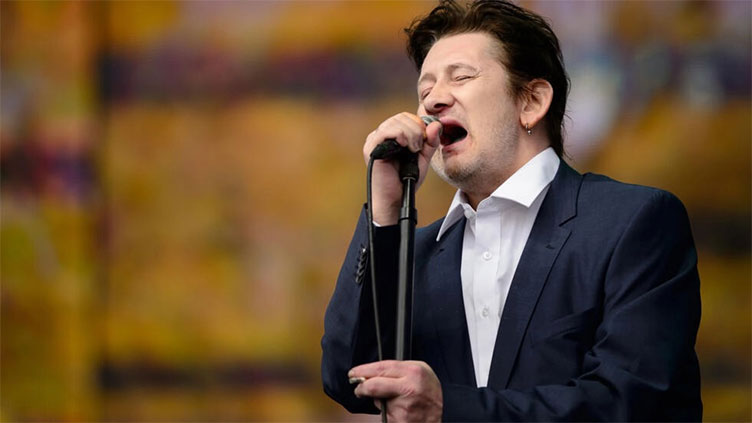Shane MacGowan, folk-punk Pogues frontman, dies aged 65

Entertainment
Shane MacGowan, songwriter and lead singer of Celtic folk-punk band The Pogues, died on Thursday.
Dublin (AFP) – Shane MacGowan, songwriter and lead singer of Celtic folk-punk band The Pogues, died early on Thursday at the age of 65 after a long illness, his widow announced, prompting a flood of tributes.
"Shane who will always be the light that I hold before me... has gone to be with Jesus and Mary and his beautiful mother Therese," wrote MacGowan's widow Victoria Mary Clarke in an Instagram post.
Later, the band said on its official website that "Shane died peacefully at 3.30 am this morning (30 November, 2023) with his wife and sister by his side."
MacGowan, who had been in and out of hospital in Dublin since July, is most famous for penning the Christmas classic "Fairytale of New York", a duet sung with Kirsty MacColl in 1987.
Co-formed by MacGowan, The Pogues fused punk and Irish folk music. He was born in England but spent much of his childhood in Ireland with his mother's family.
The band became an international symbol of Irishness, both at home and for the sprawling diaspora, with MacGowan's contribution recognised in a slew of tributes from political leaders.
"Shane will be remembered as one of music's greatest lyricists," Irish President Michael D. Higgins said in a statement.
"So many of his songs would be perfectly crafted poems, if that would not have deprived us of the opportunity to hear him sing them," he said.
Taoiseach (prime minister) Leo Varadkar called MacGowan "an amazing musician and artist" whose songs "beautifully captured the Irish experience, especially the experience of being Irish abroad".
Micheal Martin, Varadkar's deputy, said he was "devastated" by MacGowan's death.
"His passing is particularly poignant at this time of year as we listen to Fairytale of New York -- a song that resonates with all of us," he wrote.
TRIBUTES
There were tributes too from Sinn Fein, the former political wing of the Irish Republican Army paramilitary group that fought for decades against British rule in Northern Ireland.
The Pogues' 1988 song "Streets of Sorrow/Birmingham Six", which recounted the plight of six Irishmen wrongly imprisoned for deadly pub bombings in Birmingham, was banned from British airwaves.
Sinn Fein president Mary Lou McDonald called MacGowan "a poet, dreamer and social justice champion".
"He was a republican and a proud Irish man. Nobody told the Irish story like Shane. He sang to us of dreams and captured stories of emigration," she said.
Her predecessor Gerry Adams -- a central figure in "The Troubles" and a close friend of MacGowan and Clarke -- said: "Ireland has lost a great patriot, a poet and friend of the down-trodden and marginalised."
At Dublin's Irish Music Wall of Fame, fans paid their respects, laying flowers and noting that his death came after the loss of another Irish icon, Sinead O'Connor.
"When Sinead O'Connor passed a few months ago her mural was up for months and months and I think we'll see the same reception with Shane MacGowan," said barworker Eoin McLoughlin, 21.
"You can't spend a single day in a Dublin pub without hearing some of their beautiful music... I personally think that November 30 is too early for Christmas songs but I'll be playing 'Fairytale of New York' tonight."
Outside the Olympia Theatre where The Pogues regularly performed, books editor Neil Burkey, 45, said MacGowan was "a pivotal figure" for Irish people, particularly in 1980s London.
"That was a bad time to be Irish in many ways, and he gave Irish people a voice," he told AFP.
"It was a quite a wild voice, he was a wild person, but he was greatly loved in Ireland, he'll definitely be missed."
He added: "I loved his music, it was fantastic -- proto-punk with an Irish twist, unlike anything else that has been before or since."


